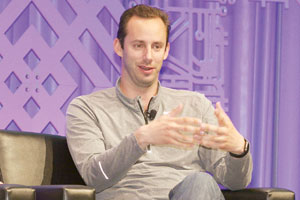Otto Accused of Stealing Google's Self-Driving Secrets

Waymo claims in a lawsuit filed Feb. 23 that was possible because a former employee stole the designs and technology and started a new company.
The complaint intensifies Alphabet’s rivalry with Uber, one of the Internet giant’s largest investments, and reflects an escalating talent war in the burgeoning autonomous-driving arena as tech and auto companies compete for skilled engineers.
Legal fights are multiplying after General Motors Co. and Uber valued upstarts — each with just a few dozen employees — as worth hundreds of millions of dollars in separate acquisitions last year.
Waymo accuses several employees of Otto, a self-driving startup Uber acquired in August for $680 million, of lifting technical information from Google’s autonomous car project. Otto is also developing a self-driving aftermarket kit for heavy-duty trucks and recently successfully demonstrated a beer delivery in Colorado. The “calculated theft” of Alphabet’s technology earned Otto’s employees more than $500 million, according to the complaint in San Francisco federal court.
“We take the allegations made against Otto and Uber employees seriously and we will review this matter carefully,”’ Uber spokeswoman Chelsea Kohler said in an e-mail.
The claims in the case include unfair competition, patent infringement and trade secret misappropriation.
“Fair competition spurs new technical innovation, but what has happened here is not fair competition,” Waymo said in the complaint. “Instead, Otto and Uber have taken Waymo’s intellectual property so that they could avoid incurring the risk, time and expense of independently developing their own technology.”
Waymo was inadvertently copied on an e-mail from one of its vendors, which had an attachment showing an Uber lidar circuit board that had a “striking resemblance” to Waymo’s design, according to the complaint.
Anthony Levandowski, a former manager at Waymo, in December 2015 downloaded more than 14,000 proprietary and confidential files, including the lidar circuit board designs, according to the complaint. He also allegedly created a domain name for his new company and confided in some of his Waymo colleagues of plans to “replicate” its technology for a competitor.
According to Waymo's suit, Levandowski installed "specialized software" on his corporate laptop in December 2015, loading it with 14,000 confidential files about lidar technology, vital to autonomous driving. "Levandowski took extraordinary efforts to raid Waymo’s design server and then conceal his activities," the suit reads.
In January of last year, he began telling Alphabet colleagues about plans to "replicate" its technology at a competitor. The suit says he visited Uber's San Francisco headquarters Jan. 14, 2016, and the next day he formed a company that would become Otto.
Less than two weeks later, he resigned from Alphabet without notice.
Alphabet's lawsuit comes after a wave of significant departures from its car unit, which has still not delivered a commercial service despite years of work.
Some workers may have had additional impetus to leave. At the onset of its car project, Google set up a pay system that would reward early employees greatly upon departure, as Bloomberg News reported earlier. "Notably," Waymo's lawsuit reads, "Otto announced the acquisition [by Uber] shortly after Mr. Levandowski received his final multimillion dollar compensation payment from Google."
Levandowski was among the first to exit. He didn't respond to phone calls seeking comment.
"We did not steal any Google IP [intellectual property],'' Levandowski told Forbes last year in comments that were republished Feb. 23. "Just want to make sure, super clear on that. We built everything from scratch and we have all of the logs to make that — just to be super clear.''
"These are very serious allegations, if true," said Tyler Ochoa, a professor at Santa Clara University School of Law. "The trade secret case by itself is a blockbuster."
Waymo’s complaint contains such specific information about the devices used and the dates the information was downloaded that it’s "hard to believe they’d put those accusations into print unless they had evidence," Ochoa said in an interview.
Alphabet’s venture capital arm, GV — formerly known as Google Ventures — is an early backer of Uber.
Waymo’s lawsuit is ill-timed for Uber, a company already mired in crisis over allegations of sexual harassment and recently beset by customer losses due to ties to President Donald Trump. Uber this week set up a commission led by former U.S. attorney general Eric Holder to investigate a former developer’s allegations of sexual harassment and discrimination by her manager. Weeks earlier, CEO Travis Kalanick stepped down from the president’s business advisory council after customers defected, citing his affiliation with Trump.
Tesla Motors Inc., meanwhile, is suing the former head of its Autopilot program over claims he broke his confidentiality agreement with the company when he founded a startup with a former Google car engineer. In January, the electric carmaker accused Sterling Anderson of starting working last summer on the autonomous car venture, Aurora Innovation, that he set up with Chris Urmson, the former head of Google’s self-driving car project. Anderson left Tesla in December.
In another dispute over intellectual property in the self-driving space, Google in December accused a former employee of breaching his contract obligations over possession and use of confidential information when he went to work for startup Drive.ai.
Bloomberg's Joe Schneider, Joel Rosenblatt and Dana Hull contributed to this report.


